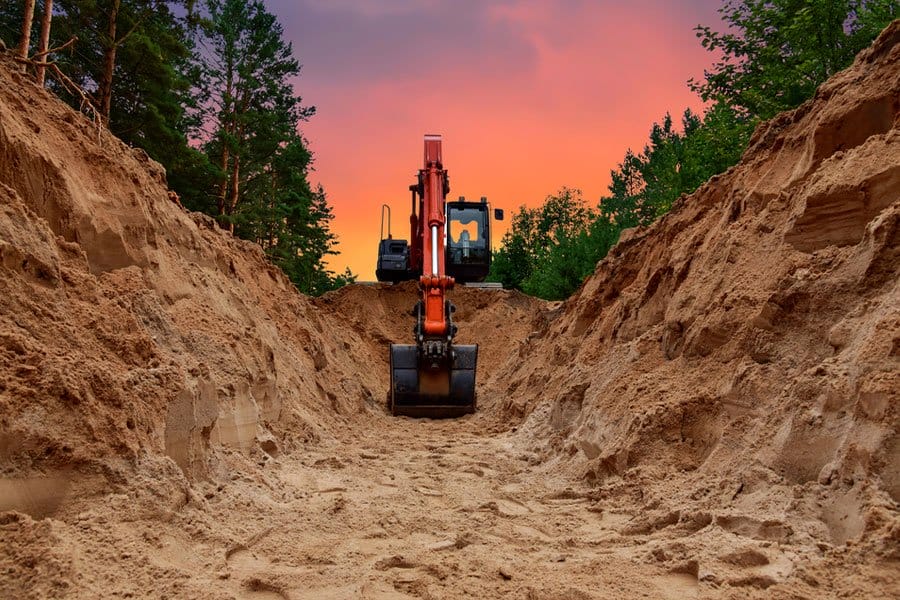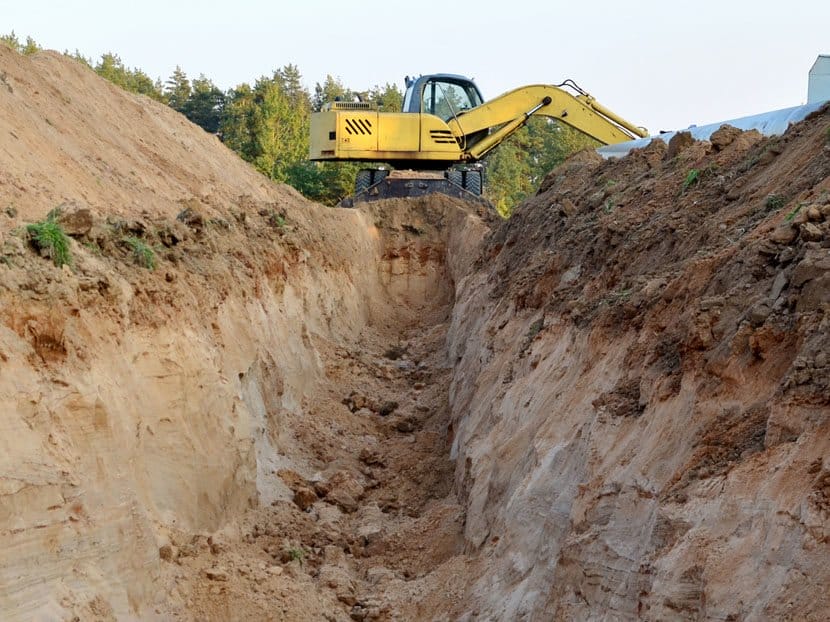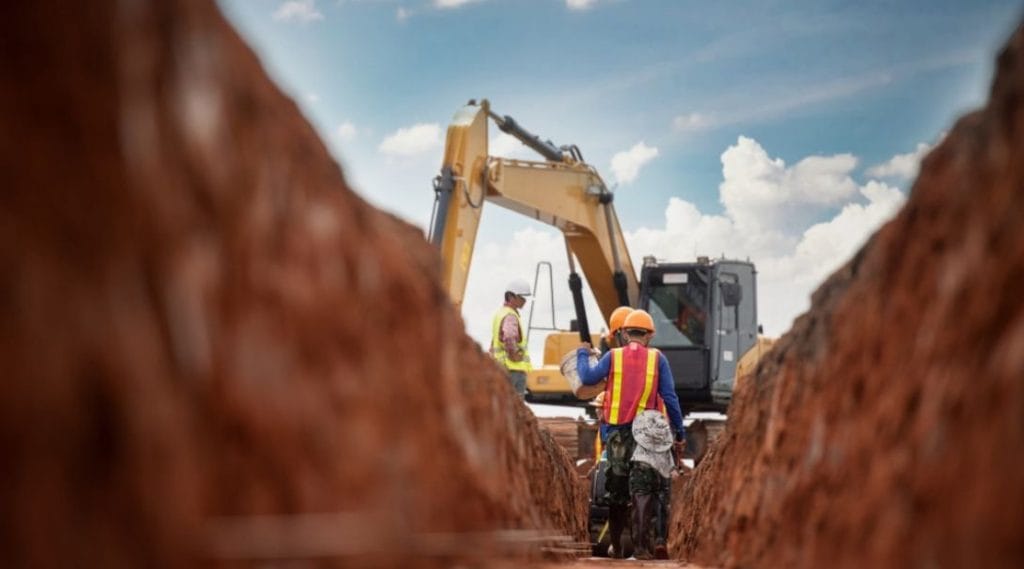
excavation / trenching underground construction
At Keystone Industries, we specialize in professional excavation and trenching services tailored to meet your specific needs. Whether you’re planning a construction project, installing utilities, or need land preparation, our experienced team is here to assist you.
With a commitment to precision and safety, we utilize advanced equipment and techniques to handle various excavation and trenching tasks. Our services encompass everything from site grading and foundation preparation to utility trenching and drainage solutions.
As a trusted excavation and trenching contractor serving the Portland and Vancouver metropolitan areas, we understand the importance of efficient and accurate work. Our team is dedicated to delivering top-notch results that align with your project timeline and budget.
When you partner with us, you can expect professionalism, attention to detail, and a focus on minimizing disruptions to your property. From residential to commercial projects, we’re equipped to handle excavation and trenching projects of all sizes.
Contact us today to discuss your excavation and trenching needs. Let us help you turn your vision into reality with our reliable and expert services. Go to view all our Land Clearing Services
Excavation and Trenching: Essential for Underground Construction
Excavation and trenching play a crucial role in the process of underground construction. These activities involve digging trenches in the ground to create space for various construction purposes. Whether it’s installing underground utilities, building foundations, or carrying out demolition work, excavation and trenching are essential steps to ensure a successful construction project.

What is Trenching?
Definition and Importance
Trenching can be defined as the process of digging long, narrow excavations in the ground. These trenches are typically used for laying utilities such as pipes, cables, and conduits, or for constructing foundations or drainage systems. Trenching is important because it provides a safe and organized way to install and maintain underground infrastructure.
Trenching Contractor: Who are They and What Do They Do?
A trenching contractor is a professional who specializes in excavating trenches for various construction purposes. These contractors possess the necessary knowledge, skills, and equipment to carry out trenching work safely and efficiently. They work closely with engineers and construction project managers to ensure that trenches are dug according to specified specifications and requirements.
Trenching Services: Overview and Types
Trenching services encompass a wide range of activities that involve digging and preparing trenches for construction purposes. Some common types of trenching services include:
- Utility trenching: This involves digging trenches to install water lines, gas lines, sewer systems, and electrical conduits.
- Foundation trenching: This type of trenching is necessary for constructing building foundations.
- Drainage trenching: Trenches are dug to create efficient drainage systems that prevent water pooling.
Why Do You Need an Excavation Contractor?
Understanding the Role of an Excavation Contractor
An excavation contractor is responsible for overseeing and carrying out excavation work for construction projects. They are skilled in operating heavy equipment such as backhoes and excavators to dig trenches, remove soil, and prepare the site for construction. Excavation contractors work closely with architects, engineers, and project managers to ensure that excavation is done correctly and safely.
Excavation Services: What to Expect from Professionals
When hiring an excavation contractor, you can expect a range of services that include:
- Trenching and excavation for underground utilities
- Demolition of existing structures
- Backfilling and compaction
- Excavation for foundations and basements
- Site preparation for construction projects
Demolition: An Aspect of Excavation for Construction Projects
Demolition is often an integral part of excavation work, especially when a construction project involves replacing an existing structure or clearing the site for new development. Demolition requires careful planning and execution to ensure the safe and efficient removal of structures or buildings. Skilled excavation contractors have the expertise and equipment necessary to handle demolition projects effectively.
How to Choose the Right Underground Construction Contractor?
Factors to Consider when Hiring an Underground Construction Contractor
When choosing an underground construction contractor, several factors should be taken into account:
- Experience: Look for a contractor with a proven track record in completing underground construction projects.
- Reputation: Check for positive reviews and recommendations from previous clients.
- Licensing and Insurance: Ensure that the contractor is properly licensed and has adequate insurance coverage.
- Expertise: Determine if the contractor specializes in the specific type of underground construction you require.
The Importance of Experience in Underground Construction Projects
Experience is a crucial aspect when it comes to underground construction projects. Experienced contractors have the knowledge and expertise to handle unexpected challenges that may arise during excavation, trenching, and installation. They can provide valuable insights and recommendations to ensure that the project is completed successfully.
Full-Service Contractors: Delivering Comprehensive Underground Solutions
Full-service underground construction contractors offer a comprehensive range of services that cover all aspects of underground construction. These contractors are equipped to handle projects of various sizes and complexities, from residential to commercial and industrial projects. Choosing a full-service contractor ensures that all your underground construction needs are met under one roof, saving you time and effort.

What Are the Different Types of Underground Utilities?
Overview of Common Underground Utility Systems
Underground utility systems refer to the network of pipes, cables, and conduits that deliver essential services such as water, electricity, gas, and telecommunications. Common types of underground utilities include:
- Water lines
- Sewer systems
- Electrical conduits
- Fiber optic cables
Understanding the Role of Conduits in Underground Construction
Conduits are an essential component of underground construction. These hollow tubes provide a protective pathway for electrical cables and other utilities, ensuring that they are safely housed underground. Conduits also allow for easier maintenance and repair of utilities without causing disruptions.
Importance of Proper Installation for Underground Utility Networks
Proper installation of underground utility networks is essential to ensure efficiency, reliability, and longevity. Improper installation can result in utility malfunctions, leaks, or even costly repairs. By hiring a reputable underground construction contractor, you can be assured that your utility networks will be installed correctly, minimizing the risk of future issues.
How to Successfully Undertake an Excavation Project?
Step-by-Step Guide to Excavation and Trenching for Construction
Undertaking an excavation project requires careful planning and execution. Here is a step-by-step guide to help you successfully complete an excavation project:
- Project planning: Define the scope of the excavation project, including the purpose, size, and location of the trenches.
- Site preparation: Clear the site of any obstructions, mark the boundaries of the trenches, and ensure the necessary permits are obtained.
- Select appropriate equipment: Choose the right machinery and tools based on the soil type, depth of excavation, and other project requirements.
- Excavation process: Dig the trenches according to the specified dimensions, ensuring that the sides are properly sloped and supported to prevent collapses.
- Installation of utilities: Lay pipes, cables, or conduits within the trenches, ensuring proper alignment and connections.
- Backfilling and compaction: Refill the excavated soil into the trenches, compacting it to provide stability and support to the utilities.
- Project completion: Perform any necessary finishing touches, inspections, and testing to ensure the trenches are ready to be used.
Equipment and Techniques Utilized in Excavation
Excavation projects require the use of specialized equipment and techniques to ensure efficiency and safety. Common equipment used in excavation includes backhoes, excavators, and trenchers. Techniques such as slope excavation and benching are employed to prevent collapses and maintain stability during the excavation process.
Residential Excavation: Considerations for Homeowners
For homeowners planning excavation projects on their property, a few considerations should be kept in mind. These include obtaining the necessary permits, consulting with utility providers to ensure accurate utility mapping, and hiring experienced excavation contractors who understand the specific requirements and challenges of residential excavation.
For any excavation, trenching, or underground construction needs, contact us today for a free quote. Our team of specialists has the expertise and equipment to handle projects of any scale. Whether you require trenching services, installation of underground utilities, or demolition services, we are second to none. With our in-depth knowledge of the Phoenix, Maricopa, and wider Arizona areas, we are the trusted contractor for all your excavation and trenching requirements.

Oregon
Portland, Beaverton, Gresham, Hillsboro, Corbett, Cornelius, Fairview, Forest Grove, Gladstone, Happy Valley, King City, Lake Oswego, Milwaukie, Oregon City, Sherwood, Tigard, Troutdale, Tualatin, West Linn, Wilsonville, Wood Village, Aloha, Beavercreek, Boring, Cedar Mill, Clackamas, Damascus, Dunthorpe, Garden Home, Raleigh Hills, West slope.

Washington
Vancouver, Battle Ground, Camas, Washougal, Ridgefield, La Center, Yacolt, Hazel Dell, Minnehaha, Salmon Creek, Walnut Grove, Orchards.